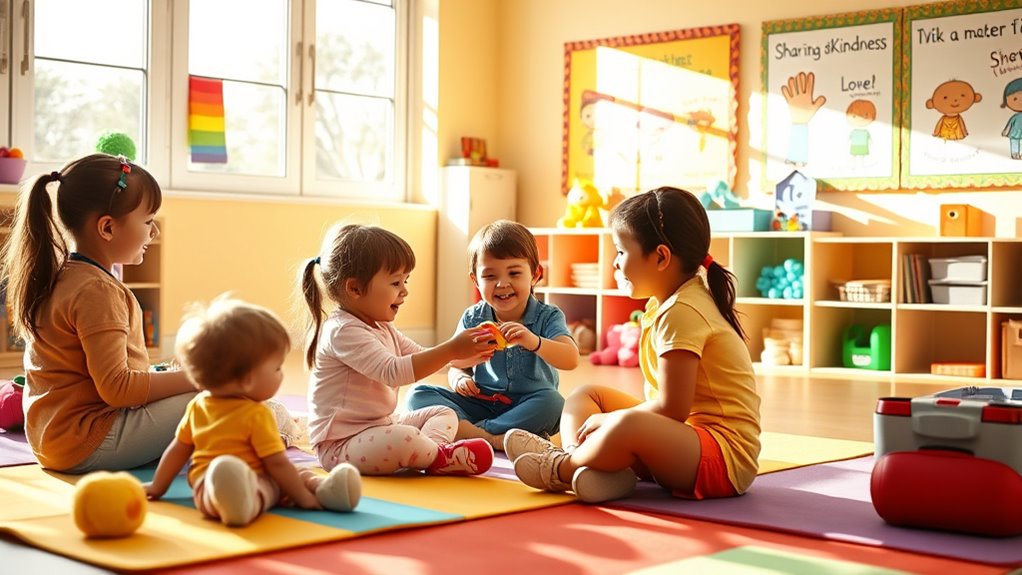To teach your preschooler empathy and sharing, model caring behavior by verbalizing feelings and encouraging them to express their own. Use everyday moments, like playtime or mealtimes, to prompt sharing and discuss others’ perspectives. Praise their efforts and guide them through conflicts with calm questions that promote understanding. Consistently practicing these skills helps your child develop emotional intelligence and healthy social habits. Keep exploring ways to foster their compassionate growth; more ideas await you.
Key Takeaways
- Model empathetic behavior by verbalizing understanding of others’ feelings to teach recognition.
- Encourage open expression of emotions to build awareness and empathy in preschoolers.
- Use everyday activities like sharing during play or meals to promote caring actions and kindness.
- Guide children to consider others’ perspectives by asking questions about their feelings during conflicts.
- Incorporate empathy-building activities to reinforce social skills and foster emotional understanding.

Have you ever wondered how to help your preschooler develop empathy and learn to share? Teaching these important social skills is essential for their emotional intelligence and future relationships. When you focus on nurturing your child’s ability to understand and respond to others’ feelings, you’re laying the groundwork for effective conflict resolution and healthy social interactions. At this stage, your preschooler is beginning to recognize that other people have emotions and needs, and guiding them to respond appropriately can make a big difference.
One of the best ways to foster emotional intelligence is by modeling empathy yourself. When you notice someone upset or in need, verbalize your understanding. For example, say, “I see you’re sad because your toy broke. That must be frustrating.” Your child will learn that recognizing feelings is important and will start to imitate this behavior. Additionally, encourage your preschooler to express their own feelings openly, helping them build awareness of their emotions. When they share how they feel, it becomes easier to teach them how to interpret others’ emotions as well.
Model empathy by verbalizing understanding and encouraging your child’s emotional expression.
Learning to share naturally ties into developing emotional intelligence. When your child sees sharing as a way to connect and show kindness, they’re more likely to develop genuine empathy. Use everyday opportunities to prompt sharing, like during playtime or mealtime. Praise their efforts when they share, emphasizing how their actions help others feel happy and cared for. This reinforcement helps them understand that sharing isn’t just about taking turns but about caring for others’ feelings.
Conflict resolution is another critical skill that supports empathy and sharing. When disagreements happen, guide your preschooler to listen and consider the other person’s perspective. Instead of rushing to solve the problem for them, ask questions like, “How do you think your friend felt when you took the toy?” or “What can you do to make things right?” This approach encourages your child to think about others’ emotions and find solutions that respect everyone involved. Over time, they’ll learn to handle conflicts calmly and thoughtfully, which strengthens their emotional intelligence and social competence. Incorporating activities that promote empathy can further reinforce these skills and help your preschooler practice understanding others in a safe environment.
Frequently Asked Questions
When Should I Start Teaching My Child About Empathy?
You should start teaching your child about empathy early, around age two, as part of their natural social development. During this time, their empathy development begins to grow, and they start understanding others’ feelings. Use everyday moments to model sharing milestones and encourage your preschooler to recognize emotions. By doing so, you help them build essential social skills, making it easier for them to connect and share with others as they grow.
How Can I Handle My Preschooler’s Selfish Behaviors Effectively?
Remember, patience is a virtue. To handle your preschooler’s selfish behaviors, focus on behavior management by setting clear boundaries and consistent rules. Use positive reinforcement to praise sharing and kindness, encouraging these behaviors. When they act selfishly, calmly explain why sharing is important, and model empathetic behavior yourself. This approach helps them learn self-control and social skills, turning selfish moments into opportunities for growth and understanding.
What Are Some Fun Activities to Promote Sharing Skills?
To promote sharing skills, try engaging your preschooler in fun group activities and role-playing games. Group activities encourage collaboration and patience, while role-playing helps them practice sharing in different scenarios. You can create simple games where they take turns or share toys, reinforcing positive behavior. Keep activities playful and positive, praising their efforts. These activities make learning sharing enjoyable and help your child develop important social skills naturally.
How Do I Model Empathy for My Preschooler Daily?
You can model empathy daily by demonstrating role modeling and emotional recognition. Show your preschooler how to contemplate others’ feelings by talking about your own emotions and explaining why you feel a certain way. When they see you listening carefully and responding kindly, they learn to do the same. Consistently expressing understanding and compassion helps your child develop empathy naturally through your example.
What Signs Indicate My Child Is Developing Empathy?
Think of your child’s empathy as a blossoming flower, slowly opening to the world. Signs include emotional recognition of others’ feelings, like noticing when a friend is upset, and offering compassionate responses, such as comforting words or hugs. When your preschooler shows concern, shares willingly, or tries to help, they’re developing this essential skill. These behaviors reveal their growing ability to understand and connect emotionally with those around them.
Conclusion
By teaching your preschooler empathy and sharing now, you’re laying the foundation for strong social skills that last a lifetime. Did you know that children who develop empathy early are 40% more likely to build positive relationships later? Keep encouraging these values through patience and modeling kindness. Remember, your guidance shapes their understanding of others, helping them become compassionate, cooperative individuals. Every small effort counts in helping your child grow into a caring and empathetic person.









